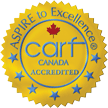An Independent Medical Examination (IME) can be a stressful experience for anyone, but it does not have to be. At NYRC, our job is to make sure that your assessment experience is as easy and pleasant as possible. While we have already described what an IME is and which professionals can conduct this procedure, now it is time to dive into more detail from the perspective of the most important person during any IME – you, the examinee. Whether you were asked to attend an IME by your insurance company, your lawyer or some other referral source, knowing exactly what is going to happen and how to prepare for your appointment will help you feel more confident and relaxed and set you up for a pleasant process. Here is what you should know about IMEs as an examinee.
A brief reminder: An IME is a simple process that allows an independent, third-party medical professional to assess and evaluate your medical history and your physical or mental and behavioural condition to help validate the claims made within your application.
Plan to Arrive Early
If your IME is scheduled for 10 am, be sure to get to the office by at least 9:30 am. This 30-minute gap is what you will need to complete any necessary paperwork and screening questionnaires before you see the medical professional. It also gives you an opportunity to relax in our fully equipped reception area before your appointment. Arriving late for an IME appointment is not advised. Depending on how late you arrive, your appointment may be cancelled as our medical expert has allocated a specific time slot for you. We, of course, realize that life happens, and in the event of extraneous circumstances, the NYRC team will do what it can to support you in getting to your assessment on time.
Another thing to plan is your return home. If you think that after an IME you might feel too tired to drive yourself, make sure you have a backup plan. NYRC is always willing to coordinate a taxi or ride-sharing service for your return trip home if needed.
Be Ready to Talk About Your Injury
First and foremost, you should be ready to talk about your disability, injury, health condition, or symptoms and describe how they affect your life both at work and at home. The medical professional who will conduct your IME will have a list of questions to ask you, so do not worry about missing something – assessors working at NYRC always do their best to prompt examinees for the details that they need.

When describing the mechanism of injury like a car crash, for example, it can be helpful to use props when speaking with an IME professional. Feel free to use NYRC’s available resources in your examination room to assist you.
Be Brief and Honest
Try to keep your answers to any questions relevant, detailed, and consistent, focusing on the essential information about your injuries. Since this might be a new experience for you, it is helpful to practice talking to someone about these things, for example, with your counsel, family members or close friend, prior to speaking with your IME doctor.
Bring Medical Paperwork Only If You Are Asked To
An IME is a very important step in the process of working through a claim. Although you might think that it is a good idea to bring medical records or documents with you, it is best to bring only the things your insurance company, legal counsel, or assessment organization specify while scheduling your appointment. Your pertinent medical documentation will already have been coordinated, organized and sent by the entity referring you to the IME facility prior to your IME date.
If, on the date of your IME, you think a pertinent medical document is missing or was not covered, please feel free to bring it up to your IME assessor. They will make sure that you have time to share your story and will ensure that you are being heard. Experienced assessors know that their job is to provide an objective, evidence-based opinion, so let them do their best to investigate your case by talking to you and administering tests if needed.
You Will Be Asked to Sign and Complete Consents and Forms
Another important note on the paperwork: you may be asked to fill out and sign questionnaires, consent forms and other relevant documents pertaining to your IME assessment. You might do this beforehand, especially if your IME is virtual or right before the appointment. If you feel worried that you will not have enough time to read through what you are asked to sign, you can request to see the forms ahead of time from your insurance company, legal counsel or the assessment facility. NYRC will also be happy to walk you through any documents that you’re required to sign and ensure that you are able to give informed consent.
For NYRC, as a third-party organization, it is vital to ensure the flow of information between the examinee (you), us, the assessor, and your referring party is secure, efficient and mutually consented. NYRC’s industry-leading IT and physical security will ensure that all your information is protected and secure and that it will only be shared with the assessor you are seeing and the referral source from which the information came.
Your Feedback Matters
Your experience with our IME experts and within our facility is very important to us. Following your IME, NYRC will provide you with a short one-page satisfaction survey so you can let us know how we did and how we can better serve you in the future. Your feedback will be reviewed during our monthly management meetings to allow for discussion amongst our leadership team on how best to improve our services for people like you.
Visit this page to learn more about our disability assessments, IME services, and what we do to make sure that your experience with NYRC is professional, effective, and pleasant.
Stay safe and healthy!



